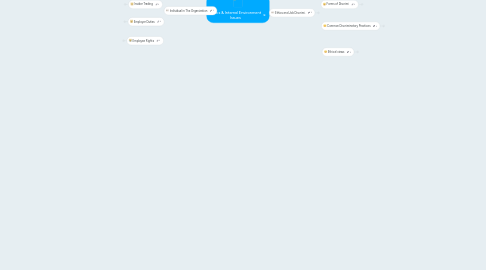
1. Employee Rights
1.1. Rights to Privacy Determine what, to whom, and how much information about himself/herself shall be disclosed= bebas buat apa tanpa diketahui oleh majikan
1.2. *****Rights to Freedom of Conscience Right employee has to disclose unethical conduct or practice by company to the third parties (i.e. whistleblowing )= memberitahu pihak tertentu tentang kesalah etika berlaku dalam organisasi
1.2.1. Whistleblowing 1. Internal 2. External Criticism Employee has contractual duties to be loyal to the employer= law of agency Mesti internal dulu baru external, 4 keadaan (disokong) i) salah laku jelas beri ancaman kpd pengguna ii) lepas buat internal, gagal baru external iii) xde pembaikan dilakukan oleh top manager setelah diajukan kesalahan etika berlaku iv) kes cukup serious, babitkan nyawa +2 keadaan (bertanggungjawab) i) ada kemahiran, tanggungjawab lapor pihak keiga ii) kesalahan organisasi sangat serious
1.3. Rights to Participate Related to employee rights to involve in open discussion, share opinion and idea, participate in decision making process= bebas untuk mengemukakan pendapat dan buat keputusan
1.4. Caring Organization i)Caring is undertaken as an end in itself not as a means to productivity ii)Caring is essentially personal iii)Caring is growth-enhancing for the cared-for Critics Caring too much Lead to “burnout” when the needs of others are given too much weight compared to the needs of the self Not caring enough Leads us to ignore their needs Leads us to treat employee as liabilities not as an asset = caring sangat terkongkong, xcaring terpinggir
2. Employer Duties
2.1. Provide fair wages
2.1.1. 7 consideration in deciding fair wages: 1. Wages in the industry and local area 2. The firm’s ability to pay 3. The risks, skills, and demands of the job 4. Minimum wage laws 5. Fairness in comparison to other salaries in the firm 6. Fairness of wage negotiations 7. *Local living costs
2.2. Provide Fair Working Condition
2.2.1. 1. Capable to improve working conditions and its needed 2. Employer knows about the bad working conditions 3. Employer is not prevented from changing condition
3. Insider Trading
3.1. Supporter of Insider Trading Argue: 1.Price reflect the true value of the stock 2. Doesn’t harm any parties 3. Having advantage in the stock market
3.2. Critics of Insider Trading Argue: 1. Cannot share information with other parties without owner consent considered as theft of information 2. Harmful effect on the stock market because it will increase the cost of buying and selling stock 3. Advantage cannot be considered as expert advantage because it is based on theft
4. Guidelines to Avoid or Eliminate Conflict of Interest
4.1. 1. Avoid to involve in project related to family members 2. Eliminating the interest that creates the conflict of interest 3. All decision must not conflict with company’s interest)
5. 7 Guidelines When Accepting Gifts
5.1. Consider *value of the gift *purpose of the gift *circumstances of the gift * job of the recipient *accepted local practices *company policies on gifts *legal prohibitions on gifts
6. Organizational Model
6.1. Rational Model Organization design, formal structure and the relationship between parties purposely to achieved an economic / technical goal with maximum efficiency
6.2. Political Model Organization focus on formal and informal power lines, influence competition between groups to secure power
6.3. Caring Model Relationship network which focus on person or individual NOT to profit and quality
7. Individual in The Organization
8. Ethics and Job Discrimi.
8.1. Wrongful act DISTINGUISHING illicitly AMONG PEOPLE not on basis of indi. merit but on the basis prejudice or some other invidious/morally reprehensible attitude
8.2. 1. Element 2. Form 3. Common 4. Views
9. Elements of Employment Discrimi.
9.1. 1. Decision has harmful effect on employees’ interest or benefits (jobs opportunity, promotions, salary)
9.2. 2. Decision towards ind. not based on individual merit (employee)
9.2.1. not based on individual merit
